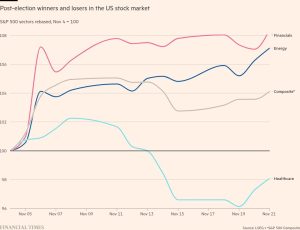The superpower glass ceiling

Unlock the White House Watch newsletter for free
Your guide to what the 2024 US election means for Washington and the world
The writer is a professor of history at Princeton University
The autopsy results have been flooding in. Democrats’ hopes of retaining the US presidency perished, so the diagnosis goes, because of what the party failed to do, and because of what it chose to do. It failed to detach itself sufficiently from a fading incumbent, and to hammer home a cogent message on the economy and migration. Simultaneously, it is claimed, Kamala Harris and her advisers relied too easily on the foundational importance of class, race, and gender. Yet these identities proved unstable supports, gender most of all.
Yes, 53 per cent of women voted for Harris. But this was less than Biden secured in 2020; while, among white women, a majority went for Trump. Gender troubles loom wider than this. There have been occasional female contenders for the presidency since the 1960s. None has succeeded. Across the globe, the number of women elected heads of state has risen markedly since 2000. That the glass ceiling of the White House remains intact, one US broadcaster has declared, is “almost uniquely an American problem”. It is not.
Historically, it has hardly ever been the case that a great power has chosen to be led by a female. Unless, that is, the woman in question has been royal or possessed of a blood relationship with a former leader who was male.
This has not been because of any proven female incapacity to rule over big and powerful territories. In the 1700s, Maria Theresa ruled over the Austrian empire for 40 years; while the even bigger Russian empire had four female rulers that century. But these were royal women. Their birth and status worked to trump their gender. For a woman to be voted into power over a megapolity has proved a different thing entirely and infinitely more difficult.
The seeming exceptions to this rule, Indira Gandhi, who was twice elected prime minister of India, or Margaret Thatcher, say, are nothing of the sort. The former was Nehru’s daughter and married to a man with no blood relationship to Mahatma Gandhi, but the same patriotic surname. As for Thatcher, she certainly won three general elections and 11 years as prime minister. But the UK she presided over was already a much-reduced polity. By contrast, when Winston Churchill was growing up in the late 19th century, the UK was a great power, which was one reason why he generally opposed female suffrage at that time. A worldwide British empire, he insisted, needed to ensure it would be governed by men.
This Churchillian stance is not that different from one of the many jibes Donald Trump levelled against Kamala Harris. “Foreign enemies”, he told US voters, would “walk all over her”. As a global hegemon, the US needed a big man to lead it, not a mere woman. That the woman in question was Black may have rendered such Trumpian language more effective. But it was assumptions and habits to do with gender that really made it powerful. Often viewed as quintessentially a rule breaker, Trump in this regard played successfully on highly traditional archetypes and appeals: the ruler as saviour and warrior, the strong man indispensable for the welfare of a strong country.
This is not the only reason why Trump won, but it helps to account for the nature and scale of his success. Some commentators remain perplexed, for instance, as to why the president-elect’s reputedly predatory behaviour towards women did not do him more political damage. But for some American voters (and not just males) reports of such conduct were easily brushed away as further proof that Trump was the real thing, a strong man. That this was the case underlines both the persistence of double standards and, again, the different rules that often applied to royal women. Crowned female rulers (think Catherine the Great) could survive sexual scandal. But how long would more recent and uncrowned female leaders, an Angela Merkel say, have retained high office had they indulged themselves as rashly as Trump, and this had become known?
There are starker lessons to be drawn. Europeans can rightly pride themselves on the rising number of women they are electing to high political office. But they may wish to consider how far this trend stems from a tacit recognition that European states are no longer major powers in the world. For Americans, the lessons are starker still. India has not elected a woman prime minister since Mrs Gandhi. Russia and China both had female empresses but have never elected female leaders. Will the US finally break with this pattern of superpowers only choosing to be led by men? We should not count on it.
#superpower #glass #ceiling




